

Bonds sell-off continues as investors bet on rate rise. Trump's Presidency Could Upend the Way Silicon Valley Works. During the presidential campaign, Silicon Valley leaders all but uniformly rejected Donald Trump.
Now they’re struggling to come to terms with what his presidency will mean for their industry. Under President Obama, Silicon Valley became very friendly with Washington—and the relationship went both ways. Tech companies spent millions to lobby Congress, while former political strategists often left the White House for Bay Area tech jobs. After his term is over, President Obama himself is reportedly likely to stay linked to tech, with much of the work of his charitable presidential foundation tied to the progress of innovations in Silicon Valley. The reality of a Trump presidency is likely to be vastly different for tech. “He barely made any appeal to Silicon Valley for their support,” says Justin Gest, an assistant professor of public policy at George Mason University.
Trump also failed during the campaign to define his positions on so many issues that affect the tech industry. Immigration. US election 2016 results: Five ways a Donald Trump presidency changes the world. Image copyright AFP.
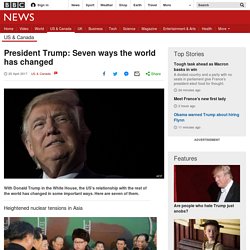
Brexit could mean more offshore deals for outsourcing - Raconteur. If all British sectors were as buoyant as outsourcing, our new chancellor would be swinging from the chandeliers of Number 11.
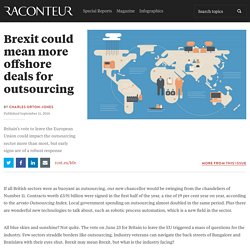
Contracts worth £3.91 billion were signed in the first half of the year, a rise of 19 per cent year on year, according to the arvato Outsourcing Index. Local government spending on outsourcing almost doubled in the same period. Plus there are wonderful new technologies to talk about, such as robotic process automation, which is a new field in the sector. All blue skies and sunshine? Not quite. First up, outsourcing seems to have carried on with business as usual. Alex John, director at international mergers and acquisitions consultants Livingstone, which works heavily in outsourcing deals, says: “We are not seeing any drop in investor confidence.
Analysis: What would a Brexit mean for the retail sector? H&M's cheap chic apparel can't save it from Brexit. Fast-fashion star H&M showed signs in its most recent financial report that even its allure of cheap, chic apparel is not immune to broader economic uncertainty — especially worries that the United Kingdom may bolt the European Union.
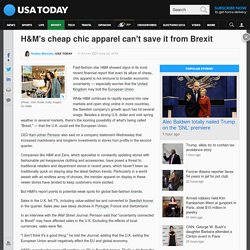
While H&M continues to rapidly expand into new markets and open shop online in more countries, the Swedish company's growth spurt has hit several snags. Besides a strong U.S. dollar and cold spring weather in several markets, there's the looming possibility of what's being called "Brexit," — that the U.K. could exit the European Union. CEO Karl-Johan Persson also said on a company statement Wednesday that increased markdowns and longterm investments in stores hurt profits in the second quarter.
But H&M's report points to potential weak spots for global fast-fashion brands. Sales in the U.K. fell 7%, including value-added tax and converted to Swedish kroner, in the quarter. What Brexit Means for the Fashion Industry. Today's news that Britain has voted to leave the European Union has sent stock markets plunging and hammered the British pound, which hit its lowest point in decades.
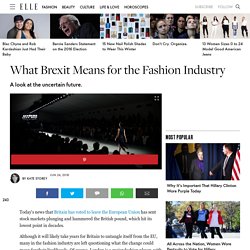
Although it will likely take years for Britain to untangle itself from the EU, many in the fashion industry are left questioning what the change could mean for their livelihoods. Of course, London is a major fashion player, with the fashion industry contributing an estimated $38 billion to the UK economy in 2014, according to the Business of Fashion.
Advertisement - Continue Reading Below A weak pound and uncertainty about new tariffs could mean major challenges for UK-based businesses, which often source fabrics and produce in other parts of Europe. Before last night's vote, the British Fashion Council surveyed its members and found that the vast majority—90% of members—wanted to remain in the EU. Why Brexit is good for the fashion industry. 6 effects a Brexit may have on the Fashion industry. London - With the EU referendum just a number of days away, both sides 'Remain' and 'Leave' are pushing hard to make their voices heard. As the rest of the world holds its breath and waits to see which way the pendulum will swing on Thursday, June 23, several prominent members of the UK's fashion industry voice their thoughts on the matter.
How Brexit may affect the British fashion industry. Ondon has been long considered one of the world’s fashion and financial capitals, as one of the world’s most creative and vibrant cities.
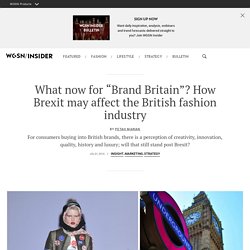
But what will the Brexit vote mean globally for “Brand Britain”? While facing reputational damage in Europe following the UK’s vote to exit the European Union, London’s perception as a cosmopolitan, multicultural hub has been dealt a second blow as the spate of racially motivated hate crimes make headlines around the world. London has garnered its reputation as a cool city because it is a place where worlds constantly collide – a city where the sari silk stores of Brick Lane rub up against the Savile Row-suited bankers of Bishopsgate.
It is exciting because in a city of 8.5 million people, three million are foreign born, bringing together a diverse range of world views, to create new experiences and amazing products. 537 × 402 - ecouterre.com 450 × 329 - perezhilton.com 650 × 366 - heraldsun.com.au 468 × 571 - dailymail.co.uk.
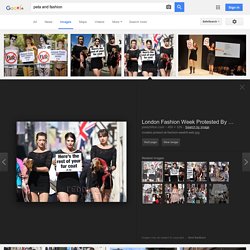
How PETA Won the Angora Debate and What It Means for Fashion. NEW YORK, United States — In the spring of 2016, a group of top-tier fashion executives convened in midtown Manhattan for a closed-door meeting.
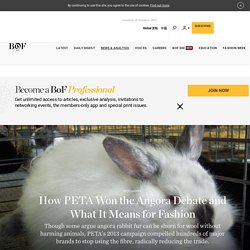
Fashion’s most iconic political statements. As the date of the UK election draws nearer, politicians have turned their attention to fashion and pop culture in an attempt to wrest the youth vote.
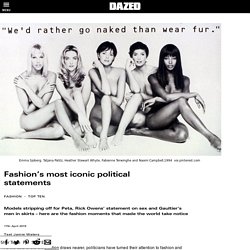
Does Fashion Have a Place in Politics? Whilst some may argue that fashion and politics have no business being mentioned in the same sentence- I disagree.
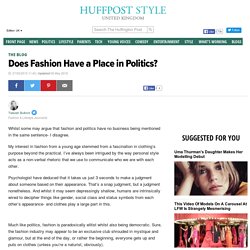
My interest in fashion from a young age stemmed from a fascination in clothing’s purpose beyond the practical. I’ve always been intrigued by the way personal style acts as a non-verbal rhetoric that we use to communicate who we are with each other. Psychologist have deduced that it takes us just 3 seconds to make a judgment about someone based on their appearance. That’s a snap judgment, but a judgment nonetheless. And whilst it may seem depressingly shallow, humans are intrinsically wired to decipher things like gender, social class and status symbols from each other’s appearance- and clothes play a large part in this. Much like politics, fashion is paradoxically elitist whilst also being democratic.